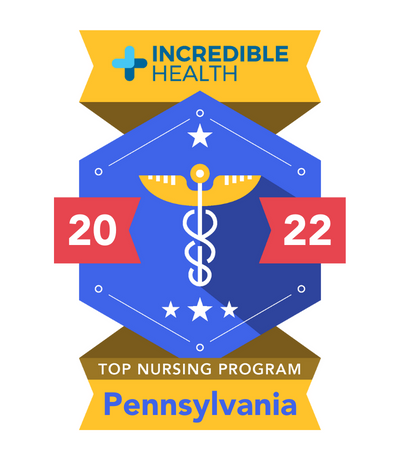Nursing Degrees & Schools / Best Schools Pennsylvania

Pennsylvania is home to a lot of historical sites and was one of the first colonies. Given that, there are many historical and prestigious schools in the state for nurses to attend. Many nurses have a hard time determining what school to choose when searching. In this post we will provide information to help a nurse make the best decision.
Many of the registered nurses in Pennsylvania want to advance their careers by going back to school to obtain a higher degree. There are many different options for nurses to choose from when it comes to nursing degree types.
Some of the more common degree types are:
- Associate Degree in Nursing (ADN)
- Bachelor of Science in Nursing (BSN)
- Accelerated Bachelor of Science in Nursing (ABSN)
- Master of Science in Nursing (MSN)
- Doctor of Nursing Practice (DNP)
However, there are also accelerated degree programs and bridge programs offered to nurse students that can greatly reduce the amount of time spent in school.
Pennsylvania has many options for nurses seeking to advance their careers. Fortunately, we have created a list of the best nursing schools in the state to help make it easier.
In this post we will explore the following:
- Our ranking methodology
- Top nursing programs in California
- Map of schools
- How to choose the right nursing program
Our ranking methodology
To capture the best schools in each state, we applied a rigorous formula, isolating five variables that were weighted equally:
- Graduation rate
- NCLEX pass rate
- CCNE accreditation
- Programs offered
- Tuition costs (based on in-state tuition, attending the maximum number of credits; mandatory fees not included)
Pennsylvania’s top nursing programs
1. University of Pennsylvania – Score 86

NCLEX pass rate: 91.11%
Tuition per year: $54,642
The University of Pennsylvania is located in Philadelphia, PA and is one of the most prestigious Ivy League in the nation. With approximately 23,000 students enrolled for the Fall 2021 semester, it’s a medium-sized campus. Additionally, the school boasts one of the best graduation rates in the country at 95%, which is impressive considering the school’s size. The undergraduate nursing program is ranked #1 in the nation and the #1 nursing program in the world.
The school offers the following programs for nursing students:
- BSN
- MSN
- DNP for Nurse Anesthetics
- PhD
- MSN to PhD
2. Pennsylvania State University – Score 74

NCLEX pass rate: 92.42%
Tuition per year: $18,898
Pennsylvania State University is located in Centre County, PA. The school is ranked 57th among national universities according to the U.S. News & World Report best colleges ranking. Their nursing school is ranked 20th by the same publication. The school has about 75,000 students, which allows its staff access to ample research. Now, some students may worry that it’s a bit too big for their taste, and that’s totally acceptable. However, the research component might offset worries about the size.
The school offers the following programs for nursing students:
- BSN
- MSN
- DNP
- PhD
3. Drexel University – Score 68

NCLEX pass rate: 97.54%
Tuition per year: $54,766
Drexel University is a private research university located in Philadelphia, PA. The school has about 24,000 total students enrolled so it’s a medium-sized school. It incorporated free indoor and outdoor wi-fi for students. The nursing program uses state-of-the-art technology and allows students to have a variety of academic options. Additionally, the school has raised about $2.9 million in external research funds.
The school offers the following programs for nursing students:
- BSN
- MSN
- DNP
- PhD
4. Desales University – Score 64

NCLEX pass rate: 85.71%
Tuition per year: $39,500
Desales University is a private Catholic university located in Center Valley, PA. The school has a medium-sized student population. Despite the small size, the school offers nurses a wide variety of classes to take. Additionally, the school allows students to take clinicals in the region at very respectable institutions.
Degrees offered:
- BSN
- MSN
- DNP
How to choose the right nursing program
Choosing the right nursing program may feel stressful. The good news is that we’ve provided several factors for you to consider to help make your decision easier. When choosing a school, some of the factors you should consider are location, tuition, NCLEX scores, and programs offered.
Location
This is a major factor for a lot of nursing students when choosing a program to attend. Most nursing programs don’t have online components, so you must select a program that you can easily commute to. The worst thing would be to choose a program that becomes a burden to you simply because it’s too far from your house.
Tuition
Let’s face it: paying for school can be a huge barrier for students. Also, many nurses end up absorbing a massive amount of student debt from their years of college. Additionally, some nurses transition into the field after spending years in another specialty or having another degree from which they’ve already accumulated student debt.
Finding a school that’s both affordable and reputable can seem challenging. Fortunately, you don’t have to jeopardize quality over price. Several of the schools we analyzed were both affordable and highly respected.
NCLEX scores
One of the most critical measures of a nursing program’s credibility is its NCLEX pass rates. The NCLEX test is an examination that measures a potential registered nurse’s aptitude. A good NCLEX pass rate for a school is anything in the 90th percentile and above.
Programs offered
The programs offered at the particular school you want to go to is critically important. You need to make sure that the school you are applying to has the program that you need. There are many different nursing programs offered at various schools. The principal baseline program offered at most universities is the BSN program. However, every person has different needs, and choosing the right program depends on the career track you are interested in.
Graduation Rate
The last factor that you should consider when choosing a nursing program is the graduation rate. A higher graduation rate indicates that the school graduates first-year students within 4-6 years at a greater rate than other schools. Knowing that your school has a proven track record of graduating students on time is crucial.
We retrieved our data from the following locations:
- University webpages
- The state board of registered nursing if applicable (for example, Pennsylvania Board of Registered Nursing)
- The U.S. Department of Education’s College Scorecard
- The American Association of Colleges of Nursing
- U.S. News Best Colleges
To calculate the scores for the respective schools, we took the lowest-scoring school from each individual metric, assigned it a 1 and gave the highest score a 10. We then were able to create brackets within that range to place each college in.
After coming up with a score for each school out of ten for their respective metric, we added them up and multiplied them by two to come up with a score out of 100.
